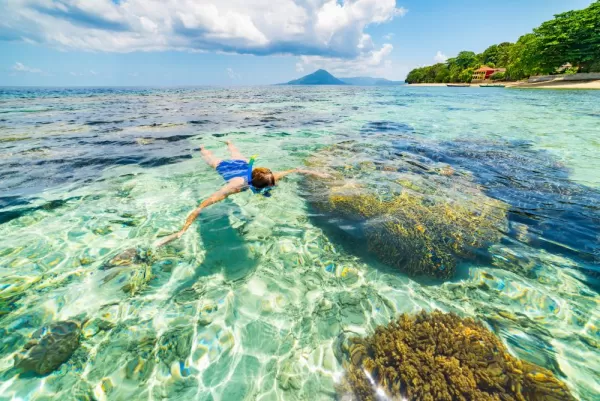Ujung Kulon
Situated in Java's southwest, this national park includes Ujung Kulon peninsula, offshore islands, and the renowned Krakatau reserve. It features the largest remaining lowland rainforests in the Java plain, home to diverse plant and animal species, including the endangered Javan rhinoceros. The park also showcases various marine ecosystems, like rocky shores, mangroves, coral reefs, and sea trenches, providing fascinating glimpses into the underwater world. During guided tours, park rangers lead small groups along a 1.2km trail through pristine rainforests, sharing insights on geological features, biodiversity, conservation, and park challenges. They explain the intricate mangrove ecology, visit the Ciduan grazing ground to look for rhino footprints and wildlife, and recommend bringing binoculars to spot birds and other creatures.
Tambling Wildlife Nature Conservation
Head to Tambling Wildlife Nature Conservation in Sumatra's southwest. Covering 45,000 hectares, including a 14,082-hectare marine park, it safeguards endemic species like tigers and sunbears. We'll explore the jungle in safari jeeps, learn about Sumatran tigers, local community efforts against poaching and habitat loss, and visit a village supporting the center's mission.
Enggano Island | Dua Island
About 100km southwest of Sumatra lies Enggano Island, one of Indonesia's 92 outlying islands. The Enggano people, one of Sumatra's oldest tribes, are ethnically linked to Java and Sumatra's indigenous tribes. Our day includes snorkeling, swimming at Dua Island's pristine beaches, a visit to the unique Bak Blau freshwater spring, possible exploration of a local village, and sunset views from this remote island.
Bengkulu
Established in 1968 by separating a region from South Sumatra, Bengkulu boasts a diverse history influenced by the Srivijaya empire, Portuguese, Dutch, and British presence. It's inhabited by various indigenous groups, primarily Rejangs, followed by Javanese and minorities, along with non-indigenous ethnicities from Indonesia. Today, we explore Bengkulu's early history, architecture, markets, and traditional Indonesian medicine, including sampling Jamu. We also visit Besurek Batik village to discover unique Arabic calligraphy motifs and Rafflesia flower designs in their batik art.
Padang | Sikuai Island
Today, we reach Padang, historically a trading hub for pepper and gold. Dutch and British rule shaped the city until Indonesia's independence. Influenced by the Minangkabau people, known for their matrilineal descent and 16th-century Islam conversion, Padang offers a cultural walking tour showcasing Dutch, English, Chinese, and Minangkabau architecture by the old port. We'll visit local markets and the unique Masjid Raya Sumatera Barat mosque. In the afternoon, we'll explore Sikuai Island's tropical forests, white sands, and coral reefs, with opportunities for hiking and sunset views from the peak.
Siberut Island
Renowned for its rich biodiversity, primates, and fringing coral reefs. The island's diverse geography, including mangrove forests, Barringtonia forests, hills, and swamps, creates a unique ecosystem. In the morning, enjoy swimming, snorkeling, and exploring the marine life at the island's southern end. After lunch on the Coral Geographer, embark on an Xplorer cruise to Katurei Bay, where remote local villages thrive on fishing and foraging, offering an opportunity to engage with the locals.
Tanah Balah Channel | Marit Island
Embark on the Xplorer for a cruise along the Tanahbala Channel, nestled between Tanah Balah and Tanah Masa Islands, surrounded by coral reefs. Explore coastal villages, and unique rock and reef formations, and observe birdlife in this secluded area accessible only by small boats. In the evening, savor beach drinks on Marit Island, precisely at the equator (zero degrees latitude), marking the midpoint between the North and South poles, dividing the Earth into two equal hemispheres.
South Nias
Nias preserves megalithic traditions, including the renowned Stone Jumping ritual, where young men leap over two-meter stone towers. The island also boasts hauntingly beautiful music, mainly performed by women. Visit UNESCO-recognized Bawomataluo Village, featuring megalithic monuments, traditional houses, and rituals. In the evening, savor a Cultural Festivity on South Nias Island, featuring traditional dance, music, and local cuisine, offering insights into the island's rich heritage.
North Nias
This morning, we explore the lesser-visited northern part of Nias, recently accessible. We receive a traditional welcome with the Eagle Dance in Sisarahili Teluk Siabang village and sample local sweets. Our local interpreter and guide lead us through the mangrove forest, sharing insights on community initiatives for this remote fishing village. In the afternoon, we make an expeditionary stop at Sena Island, offering beachcombing, swimming, snorkeling, and exploration of its two lakes.
Simeulue, Aceh
Aceh, with unique autonomy in Indonesia, practices Sharia law for Muslims living there. Respectful, conservative dress is appreciated by locals. Simeulue residents are known for vibrant dance art, featuring colorful costumes and live percussion performances. Visit Aluan, an organic coconut oil producer, for an educational tour on sustainable supply chains. Explore the Sinabang Arts and Cultural Centre to experience Nandong, a popular oral tradition, and Kedang drum performances. After lunch, the Coral Geographer sails to Simuat Island, home to coral beaches and cliffs. Snorkeling and swimming are on the agenda for a relaxing afternoon.
Banda Aceh, Aceh
In Banda Aceh, remember the 2004 Boxing Day Tsunami and pay tribute at the museum and memorial park. Afterward, explore the city and shop for souvenirs. In the evening, enjoy dinner onboard with a performance of the UNESCO-listed Saman Dance, a fast-paced traditional dance known for its rhythmic harmony among dancers, performed without musical instruments.
Medan
Medan, the capital of North Sumatra, offers a guided tour showcasing its multicultural essence. Experience a cultural performance, try Durian fruit, visit the Sultan of Delhi's Palace, photograph enduring Dutch and English Art Deco buildings, and delve into Batak Karo people's culture and history. Explore the old town on a becak tour for a taste of local life.





















